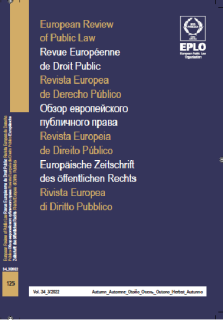
Constitutional Law / Droit constitutionnel
Austria / Autriche
Univ.-Prof. Dr., Institut für Österreichisches und Europäisches Öffentliches Recht, Wirtschaftsuniversität Wien, email: harald.eberhard@wu.ac.at
Universitätsassistent prae doc, Institut für Österreichisches und Europäisches Öffentliches Recht, Wirtschaftsuniversität Wien, email: jakob.fux@wu.ac.at
Austrian constitutional law was affected by only a few changes in 2021 and 2022. Worth discussing was the entry into force of the 15th Additional Protocol to the ECHR, which, among other issues, shortened the appeal period from six to four months. The Additional Protocol, like the ECHR itself, enjoys constitutional status in Austria. In addition, the report also contains a cursory review of the impact of the COVID-19 pandemic on the Austrian constitutional order. In this regard, the general obligation to vaccinate against COVID-19 in Austria was much discussed. The Constitutional Court held it to be constitutional in view of the temporary absence of administrative penalties. The rest of the Court’s fundamental rights case law also caused quite a stir. This included a rare finding on the unconstitutionality of state treaties, as well as innovations in the area of family and parentage law and the financing of public broadcasting. The Court found that the OPEC Headquarters Agreement was partially unconstitutional due to the violation of the right to a fair trial pursuant to Art. 6 ECHR and, by interpreting provisions of the Austrian Civil Code (ABGB) in conformity with the Constitution, ensured that cohabiting partners can also adopt jointly. Finally, the Constitutional Court repealed provisions of the ABGB relating to parentage law and provisions relating to public broadcasting and passed the implementation ball to the legislature with long transition periods in each case.
Le droit constitutionnel autrichien n’a connu que peu de changements en 2021 et 2022. L’entrée en vigueur du 15e protocole additionnel à la CEDH, qui a notamment ramené le délai de recours de six à quatre mois, mérite d’être évoquée. Le protocole additionnel, tout comme la CEDH elle-même, jouit d’un statut constitutionnel en Autriche. Le rapport contient également un examen succinct de l’impact de la pandémie de COVID-19 sur l’ordre constitutionnel autrichien. A cet égard, l’obligation générale de vaccination contre le COVID-19 en Autriche a fait l’objet de nombreuses discussions. La Cour constitutionnelle l’a jugée constitutionnelle en raison de l’absence temporaire de sanctions administratives. Le reste de la jurisprudence de la Cour en matière de droits fondamentaux a également fait sensation. Il s’agit notamment d’une conclusion rare sur l’inconstitutionnalité des traités d’Etat, ainsi que d’innovations dans le domaine du droit de la famille et de la filiation et du financement de la radiodiffusion publique. La Cour a estimé que l’accord de siège de l’OPEP était partiellement inconstitutionnel en raison de la violation du droit à un procès équitable conformément à l’article 6 de la CEDH et, en interprétant les dispositions du Code civil autrichien (ABGB) conformément à la Constitution, elle a garanti que les partenaires cohabitants pouvaient aussi adopter conjointement. Enfin, la Cour constitutionnelle a abrogé des dispositions du Code civil autrichien relatives au droit de la filiation et des dispositions relatives à la radiodiffusion publique et a renvoyé la balle de la mise en œuvre au législateur avec de longues périodes de transition dans chaque cas.
Das österreichische Verfassungsrecht war in den Jahren 2021 und 2022 lediglich von wenigen Änderungen betroffen. Besprechenswert erwies sich das Inkrafttreten des 15. Zusatzprotokolls zur EMRK, welches unter anderem eine Verkürzung der Beschwerdefrist von sechs auf vier Monate brachte. Das Zusatzprotokoll genießt wie die EMRK selbst in Österreich Verfassungsrang. Daneben enthält der Bericht auch eine kursorische Aufarbeitung der Auswirkungen der COVID-19-Pandemie auf die österreichische Verfassungsordnung. Viel diskutiert wurde in dieser Hinsicht die allgemeine Impfpflicht gegen COVID-19 in Österreich, die der VfGH angesichts des temporären Fehlens von Verwaltungsstrafen als verfassungskonform erachtete. Auch die übrige grundrechtliche Rechtsprechung des VfGH sorgte für einiges Aufsehen. Diese umfasste eine seltene Feststellung zur Verfassungswidrigkeit von Staatsverträgen und Neuerungen im Bereich des Familien- und Abstammungsrechts sowie zur Finanzierung des öffentlich-rechtlichen Rundfunks. Der Gerichtshof stellte dabei fest, dass das OPEC-Amtssitzabkommen aufgrund der Verletzung des Rechts auf ein faires Verfahren gem Art 6 EMRK teilweise verfassungswidrig ist und sorgte mit einer verfassungskonformen Interpretation von Bestimmungen des ABGB dafür, dass auch Lebensgefährten gemeinsam adoptieren können. Abschließend hob der VfGH abstammungsrechtliche Bestimmungen des ABGB und solche im Bereich des öffentlichen Rundfunks auf und spielte den Umsetzungsball mit jeweils langen Übergangsfristen an die Gesetzgebung.





















